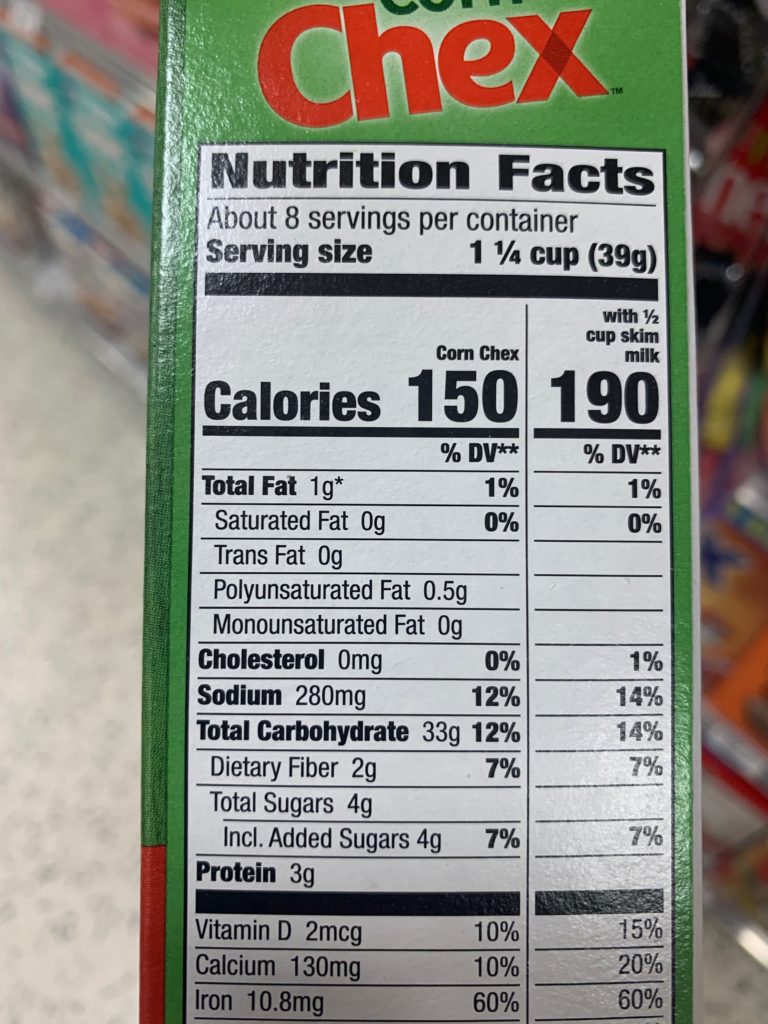Conventional dietary wisdom tells us that we should limit intake of fat, and that saturated fat is the worst!

Right at the top of the Nutrition Facts panel on any of the processed food we buy is a declaration of its fat content: Total Fat, Saturated Fat, Trans Fat, Polyunsaturated Fat and Monounsaturated Fat.
Total Carbohydrate doesn’t even get second billing: it’s below both Cholesterol and Sodium.
There was a time when I was extremely grateful for the product at right, when I had recently been diagnosed with celiac disease.
Other cereals I had tried were gluten free, but that was the most you could say for them. They were not at all tasty. Chex cereals were the first ones made for the mass market that also were gluten-free, and Corn Chex was my favorite variety.
I ate it for breakfast almost every day, and as you can see on the label I definitely wasn’t getting too much fat, even with 2% milk. But each serving did have 33g of carbohydrates, even when I didn’t add any extra sugar.
Over just a few years it played a significant role in me gaining 40 lbs. and getting to Peak Lee.
Knowing that I had been on a diet that was rich in so-called “healthy whole grains” and yet was anything but healthy, when I started to run across messages challenging this dietary consensus I was open to at least trying a different approach.
Of course it was not without a bit of concern: after all, if I lost a bunch of weight but was setting myself up for heart disease, that wouldn’t be a net benefit.
That’s why I found it really helpful to have serious scientists like Dr. Peter Attia review the literature and outline what the research on diet and heart disease really says.
I think you’ll find this video fascinating, as I did. Watch it for yourself and let me know what you think in the comments.
If you doubt that it’s worth the 79 minutes to watch, I’ll provide a few bullet point highlights below.
- Studies of Benedictine and Trappist monks, Navajo Indians, Irish immigrants to Boston, Swiss Alpine farmers and Maasai and other African pastoralists report no association of saturated fat to heart disease.
- A 1957 study of 5,400 male employees of Western Electric Company compared the 15 percent who ate the most fat to the 15 percent who ate the least. “Worthy of comment, is the fact that of the 88 coronary cases, 14 have appeared in the high-fat intake group and 16 in the low-fat group.”
- A follow-up study of the Western Electric cohort in 1981 found “The amount of saturated fatty acids in the diet was not significantly associated with the risk of death from CHD.”
- The Minnesota Coronary Study, which involved 9,000 men and women whose diets could be strictly controlled because they were in mental institutions, found 269 deaths in the intervention group (with low saturated fat and cholesterol) and 206 deaths in the control group. The results, available in 1973, went unpublished for 16 years. Why? “We were disappointed in the way they turned out.”
- 2001 Cochrane Collaboration meta-analysis involving 27 well-controlled randomized trials with 10,000 subjects followed for an average of three years each found No effect on longevity and No “significant effect on cardiovascular events.”
- A second Cochrane Collaboration meta-analysis in 2006 “Multiple risk factor interventions for primary prevention for coronary heart disease” with 900,000 patient years of observation concluded: “The pooled effects suggest multiple risk factor intervention has no effect on mortality.”
OK, now go back and watch the video. It’s a pretty compelling story.
What do you think?
See previous posts on My Health Journey, and to get future posts follow on Facebook, Twitter or LinkedIn.